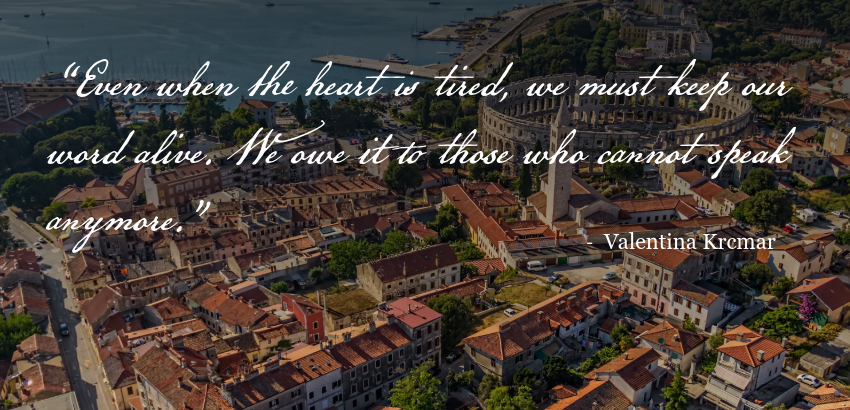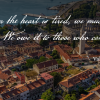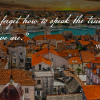
Published: December 5, 2004
View the Original Newsletter: Iskra-129.pdf
About This Issue
After a year-long pause, Hrvatska Iskra re-emerges in late 2004 with Issue No. 129 — an unexpected revival led once again by Valentina Krčmar. This issue is both a renewal and an elegy. It acknowledges the losses endured since the previous publication and rekindles the flame of diaspora journalism with courage, conviction, and faith.
Amid reflections on political shifts in Croatia and abroad, Valentina weaves in tributes to the departed, meditations on patriotism, and celebrations of community life in Canada. The tone is mature, sometimes indignant, yet ultimately hopeful — a testament that the written word remains one of the Croatian diaspora’s greatest legacies.
Editorial: “We Continue Because We Must”
In her opening letter, Valentina Krčmar confides that she had not intended to write again — until readers’ voices drew her back. She reflects on the months of silence: the passing of friends, the loss of longtime contributors, and the emotional cost of keeping a publication alive on passion alone.
She honors Mrs. Fadila Braj, a devoted community member, and Professor Ilija Eli Vranešić, her mentor and close friend. Quoting from his funeral, she recalls the line that captures his essence:
“Had love been able to keep him, he never would have died.”
Valentina also mourns Branko Milinković, husband of her colleague Biserka, including his son Boris’s heartfelt eulogy — a moving portrait of love, humility, and family devotion.
She writes candidly of closure:
“And so, before us lies the last, final issue of Hrvatska Iskra. These pages will no longer be printed, for reasons known to all. But let us not grieve — for Christmas is near, and with it comes peace.”
Motrište: “Promises Forgotten”
Valentina’s main column delivers one of her most powerful essays. She examines Croatia’s political reality following Ivo Sanader’s rise to power, expressing deep disappointment in how the ruling party has treated war veterans and the memory of the fallen
Iskra-129
.
She condemns the government’s absence from the welcoming ceremony for General Tihomir Blaškić, released from The Hague after years of imprisonment:
“When he returned, 3,000 people greeted him — but no one from the Croatian Government. Shame on you all who were not there.”
She calls it an act of moral betrayal, contrasting Croatia’s silence with Serbia’s unashamed national pride in honoring its own.
The piece deepens into a haunting description of Macelj Forest, where tens of thousands were executed after World War II. Valentina describes walking among the unmarked graves —
“The silence was suffocating. No birds, no flies, no sound of leaves — only the weight of death.”
She urges the government to properly mark all mass graves from the postwar period, arguing that a nation’s dignity is bound to how it honors its dead.
“Every victim deserves a marker. The silence of Macelj is the silence of a country that has forgotten its own.”
The essay concludes with a piercing reminder:
“As we treat our soldiers and the dead, so shall history treat us.”
National & Political Focus
The issue covers Croatia’s upcoming presidential elections, noting that Stjepan Mesić once again dominates headlines with controversial remarks — including his claim that “Montenegro never fought Croatia.” Valentina’s commentary mixes irony and weariness:
“Do we still wonder at his words? We must remember — we elected him.”
Sanader’s diplomatic visit to Belgrade, occurring just two days before the anniversary of Vukovar’s fall, is sharply criticized as “an act of tone-deaf diplomacy.”
In Memoriam
A deeply personal section pays tribute to several figures whose passing left a void in both Canada’s Croatian community and the broader cultural world:
-
Prof. Ilija Eli Vranešić (1926–2004) — celebrated artist, teacher, and community builder. Valentina recalls his passion for youth and art, and his final message: “Children are our future — teach them early.”
-
Branko Milinković, remembered through his son Boris’s moving English-language eulogy, who described his father as “a true gentleman, full of love and integrity.”
-
Zdenko Runjić, famed composer of Dalmatian songs, is also commemorated with a brief biographical note.
Community Life: “Faith, Fellowship, and Farewell”
Despite the farewell tone, the issue is alive with community spirit. Events from across Ontario include:
-
Croatian Christmas 2004, organized by the General Consulate of Croatia in Mississauga, with sponsorship from the Canadian-Croatian Chamber of Commerce and the family of Božo Gaga.
-
A North American tour by the Ivan Goran Kovačić Male Choir, performing sacred and folk music in Toronto and Oakville.
-
An appeal from the Croatian-Canadian Library and Reading Room, thanking donors for their support and calling for volunteers to sustain this “pride of our community.”
Biserka Milinković contributes an emotional farewell note to Iskra:
“For me, this marks the end of a chapter of life and service to our people. Yet even as I write with sorrow, I am proud. A nation that abandons its written word abandons its memory.”
Heritage & Identity
Historical reflections include essays on Ante Starčević, “the Father of the Homeland,” and Žumberak, a region celebrated for its beauty and enduring spirit.
A brief English-language feature titled “Welcome to Zagreb” introduces readers to Croatia’s capital through the eyes of visiting folklorists from Canada, describing their emotional homecoming: “We returned changed — filled with pride and longing.”
Law & Health
A legal column offers practical advice on wills and power of attorney in Ontario, explaining the differences between a standard will and a “living will.” Dr. Darko Desaty provides insights on patient advocacy and end-of-life planning, underscoring dignity and personal choice.
Culture & Everyday Life
Cultural and lifestyle pages embrace warmth and tradition:
-
A guide to creating homemade Advent wreaths and Christmas cookies, celebrating “the golden scent of childhood.”
-
Music feature on Mile Paulić’s CD Bijela Ptico (White Bird), praised as “a melody of home and heart.”
-
A humorous generational essay, “Čestitamo, Generacijo,” nostalgically recalls growing up without helmets, cell phones, or PlayStations — a tribute to resilience and freedom.
Closing Reflection: “The Light That Endures”
Valentina ends this final revival issue on a note of gratitude and grace.
“Hrvatska Iskra has been our flame — it gathered us, connected us, and warmed lonely hearts. Every written word was an act of faith, and every page a piece of our homeland.”
Her final benediction encapsulates her spirit and that of the Croatian diaspora she served so faithfully:
“May the light of Iskra never fade.
Where there is truth, love, and remembrance — there, it still shines.”




